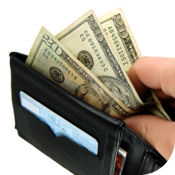 Mounting debt is on its way to becoming the national pastime, with 2 in 5 families spending more money than they earn. In the words of Madonna, "We are living in a material world."
Mounting debt is on its way to becoming the national pastime, with 2 in 5 families spending more money than they earn. In the words of Madonna, "We are living in a material world." Shopping malls are meccas of entertainment and materialism, and when we're bored, many of us head to the stores. For most people, spending money is just another part of life. But for about 6% of the U.S. population, spending money becomes an addiction. And it's a costly one: According to researchers from the University of Florida, the average compulsive spender is carrying $23,000 in debt. What is compulsive spending? Like alcohol, food, or gambling, spending can become an addiction. Compulsive spenders don't shop because they need or want things; they shop for a pick-me-up or the emotional "high" that comes from spending money. They lose their ability to rationalize purchases, and out-of-control shopping sprees become the norm. It doesn't matter how much money they're spending or which stores they're visiting. The "out-of-control" feeling that accompanies those purchases is one sign of an addiction. Spending "addicts" need not shop at the fanciest, most expensive stores to have a problem. Stockpiling tag sale finds, hoarding used books, or stashing knickknacks from garage sales are all compulsive spending habits. Compulsive spending can be a year-round problem, but experts say it is more common around the holidays, when people tend to spend more money. Compulsive shoppers use spending money-at the mall, online, or even at flea markets or yard sales-as a way to cope with depression, anxiety and loneliness. After the thrill of the purchase wears off and the reality of the expense sets in, the guilt, anxiety, or depression return, continuing the cycle of compulsive behavior. Some people shop for items they think will improve their life status, such as sports cars or electronic gadgets, while others shop for bargains and convince themselves they're actually saving money. Some spend money on "trophy" items like expensive and designer goods, while others pick up tabs or buy lavish gifts to get love and attention. Compulsive spending, which is not recognized as its own mental disorder by the American Psychiatric Association, is similar to other addictive or compulsive disorders like gambling and kleptomania. In those and other compulsive disorders, the behavior is recurring and progressively worsens over time. The "highs" of shopping can lead to debt and financial troubles, stressed relationships, lying about spending habits, along with feelings of shame, anxiety and guilt. Continued › |
7 Tips to Conquer Compulsive Spending
Signs, Symptoms and Treatments
Page 1 of 4 Next Page ›






Member Comments